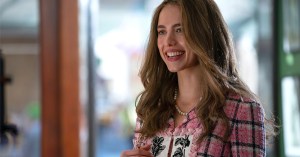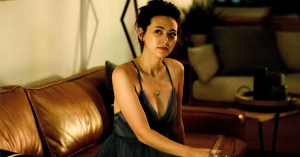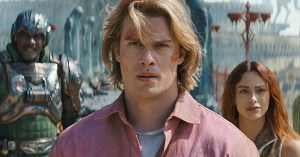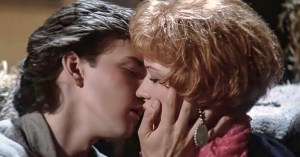RT Talks Music, Irish Stories With "Once" Director John Carney
"Once" is a small Irish film about musicians, shot on a threadbare budget, with no-name actors in the leads. Not exactly a prescription for a blockbuster. So the fact that this little film is connecting with festival audiences in a big way has even director John Carney caught by surprise.
"Once" tells the story of a Dublin street musician (the Frames’ Glen Hansard) who meets a young Czech pianist (Marketa Irglova); together, they form a deep musical and personal bond. In real life, Hansard and Irglova have been collaborators for years (check out their 2006 album, "The Swell Season"), and director John Carney utilized their chemistry to create a heartfelt portrait of two sad people finding their way.
Carney conceived the film as a small project, but it got a major boost at Sundance, where it became a critical favorite and won the festival’s Audience Award. In recent weeks, Carney, Hansard, and Irglova have been touring America by bus, screening "Once" and playing songs from its soundtrack.
"Once" opens May 18 in limited release. Carney spoke with Rotten Tomatoes about his unconventional promotional tour for the film, the concept of making a naturalistic musical, and the state of Irish filmmaking.
Rotten Tomatoes: How’s your tour across America going?
John Carney: It’s great. We’re seeing a lot of the country from the ground, and we’re meeting real people, which is not what happens when you’re just flying into airports. I’m actually getting the scale of this large place you guys call home.
RT: How’s the response been on the road?
JC: Oh, it’s been amazing. Like, weirdly good. I don’t know what it is about this film, but it seems to have connected with people, which is great, because we started it off as a small labor of love and a pet project. To have something that we did from our hearts be received warmly is vindicating and kinda rewarding as an artist.
RT: How much of this film is based upon the lives of the two leads?
JC: They brought a lot to the roles, but originally, I had written it for actors. I was pretty sure Cillian would be the guy, and I’d get an Eastern European actress to play the lead role. But that said, once they had gotten the parts, and once we decided that’s the way we were going to go, Glen and Marketa are very forceful people, and have great chemistry together as musicians, so they brought a lot of that to the finished product. But we actually had to do, structurally, very little changing of the parts once we decided that we weren’t going to go with actors who could half-sing, we were going to go with singers who could half-act. It wasn’t based on their lives, but they brought a lot of themselves to the roles.
RT: Given that you were using non-actors, was the material a hard sell?
JC: Well, you see, it wasn’t, because once we decided to go with non-actors, we also decided we wouldn’t bring it to producers. We wouldn’t try to finance the film in the normal way. We’d get a little bit of state money, and it would be the kind of thing we could shoot for nothing, basically. We’d put in all the favors, and shoot it really quickly, and get it done. If it bombed, then nobody really would have cared about it, and if it did do well, then great. There weren’t a bunch of producers checking their watches and their bank balances. It was very much a John Cassavetes approach to making a film.
RT: Do you think Irish films or filmmakers are underappreciated in the States?
JC: No, we don’t have any good films. We don’t make good films in Ireland. We have yet to find our niche, and our voice. We’ve tried to make films in the last 10 years for an American audience. They all bombed, and rightfully so. If you’re in that fight, you’ve lost the war, because America’s a massive marketplace. So we need to make films for ourselves, primarily, and then if a couple of them strike, that’s great.
Read the rest of the interview here!






